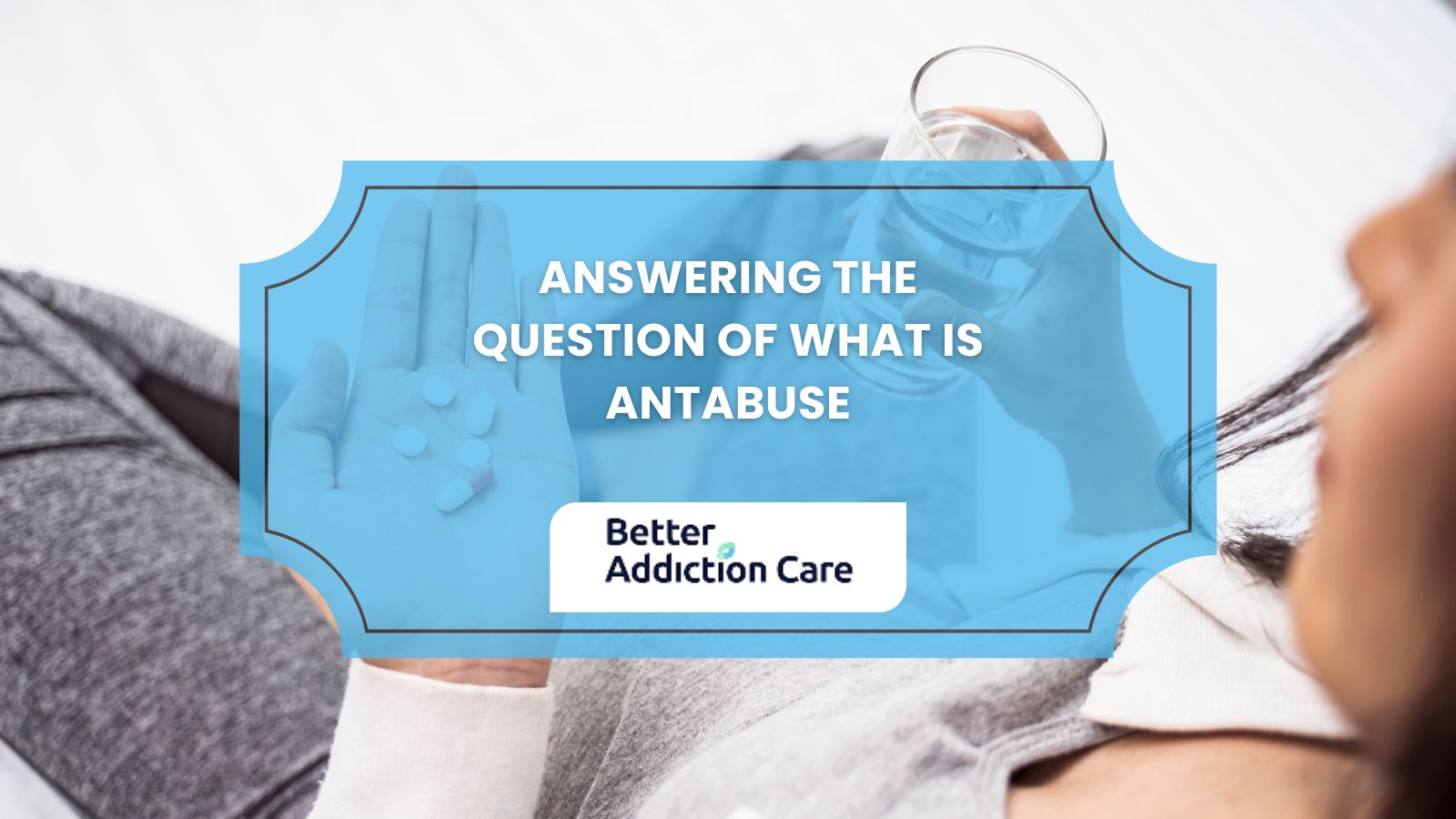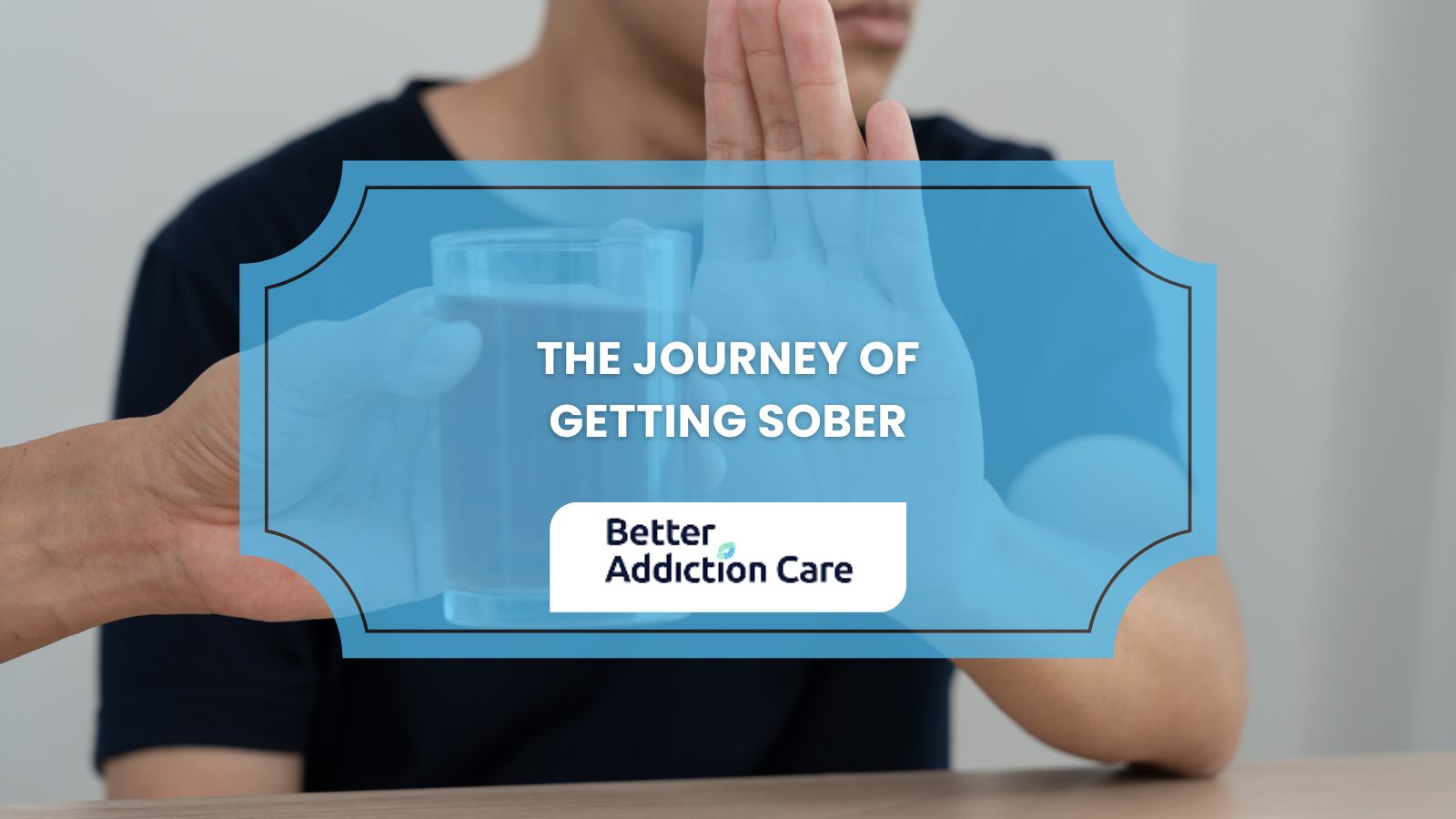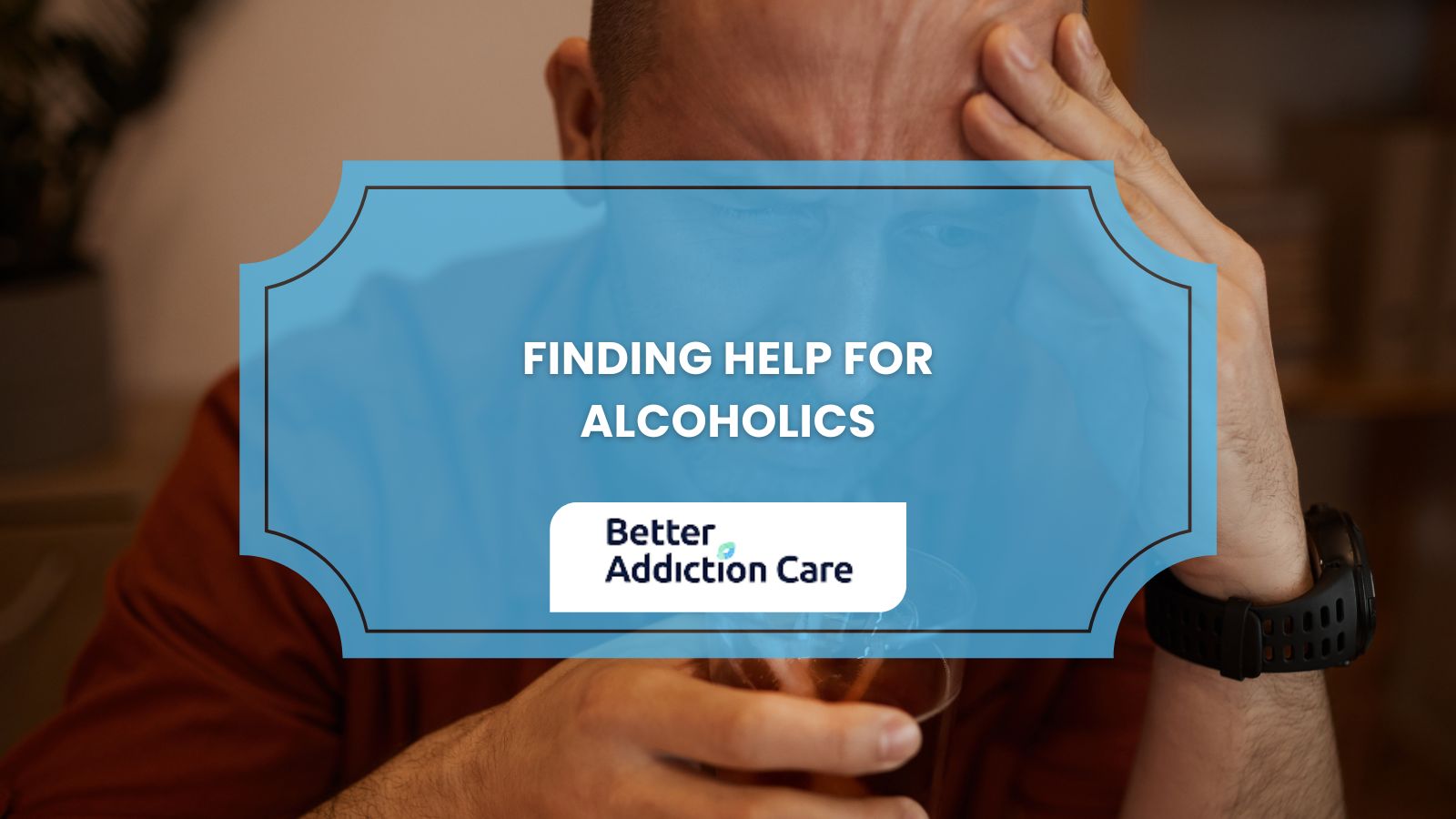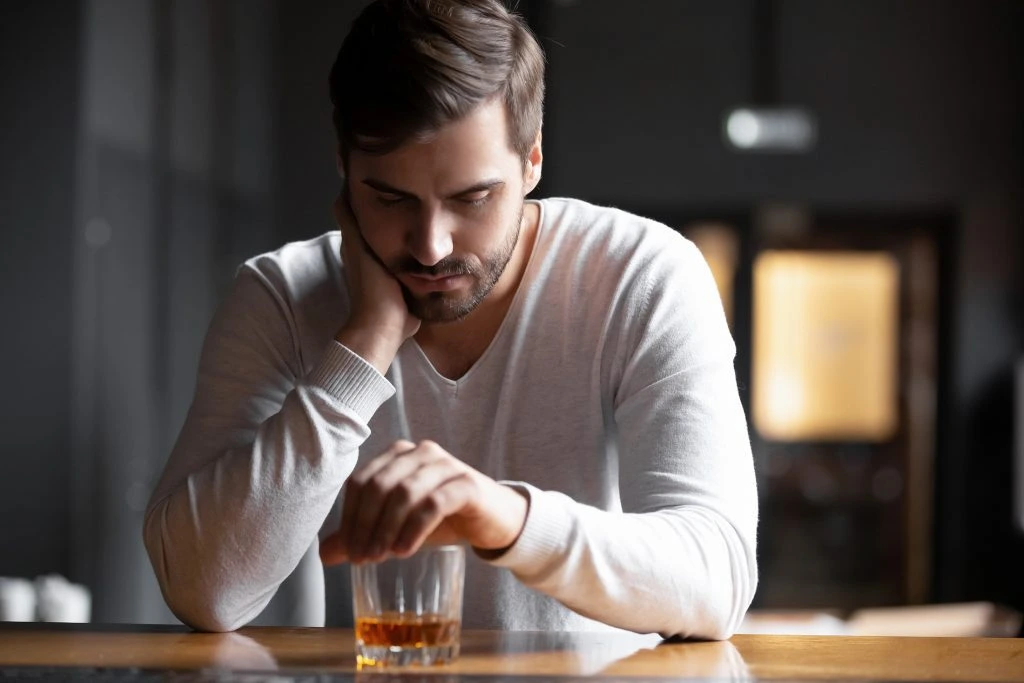Medically Assisted Alcohol Rehab Explained
Medically assisted alcohol rehab combines FDA-approved medications with behavioral therapies and counseling to address both the physiological and psychological aspects of alcohol dependence. You undergo medical detox to mitigate severe withdrawal symptoms, ensuring a safer recovery environment.
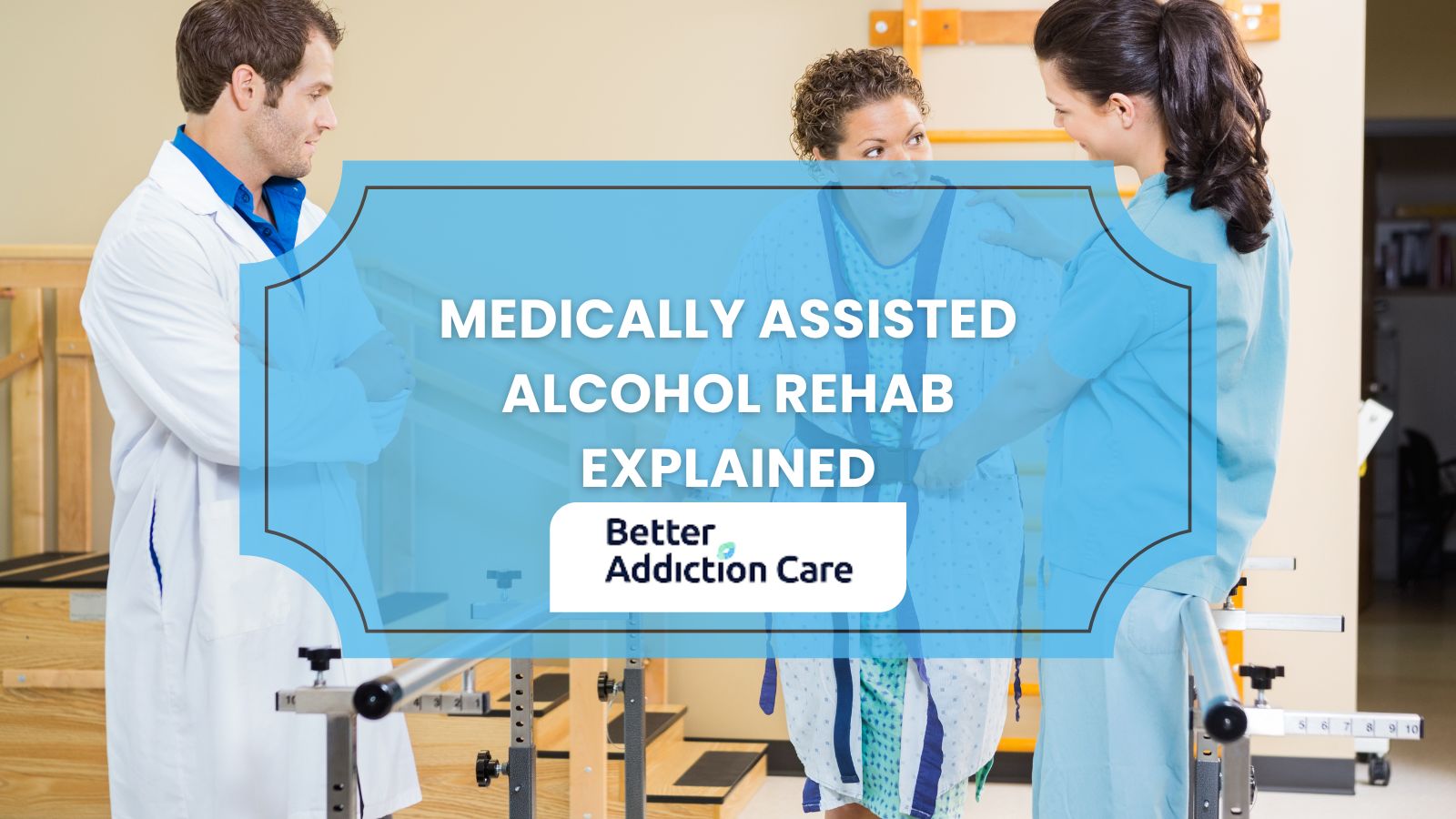
Medication-Assisted Treatment (MAT) includes Disulfiram, Naltrexone, and Acamprosate to reduce cravings and support abstinence. During detox, benzodiazepines manage withdrawal, while Gabapentin, Baclofen, and Nalmefene offer additional recovery support for alcohol use disorder.
Alcohol Use Disorder (AUD) shatters lives. It impacts millions, severing connections, derailing careers, and devastating health. With 28.9 million individuals aged 12 and older struggling with AUD in the past year alone.
What Is Medically Assisted Alcohol Rehab?
Medically assisted alcohol rehab, referred to as Medication-Assisted Treatment (MAT), is a comprehensive approach to treating alcohol addiction that integrates FDA-approved medications with behavioral therapies and counseling. This method aims to address both the physiological and psychological aspects of alcohol dependence.
The process begins with medical detoxification, where medications are administered to mitigate the symptoms of alcohol withdrawal, which is severe and potentially life-threatening. By stabilizing the individual's physical condition, MAT creates a safer and more effective environment for subsequent therapeutic interventions, ultimately enhancing the chances of long-term recovery.
What Medications Are Commonly Used For Medically Assisted Alcohol Rehab?
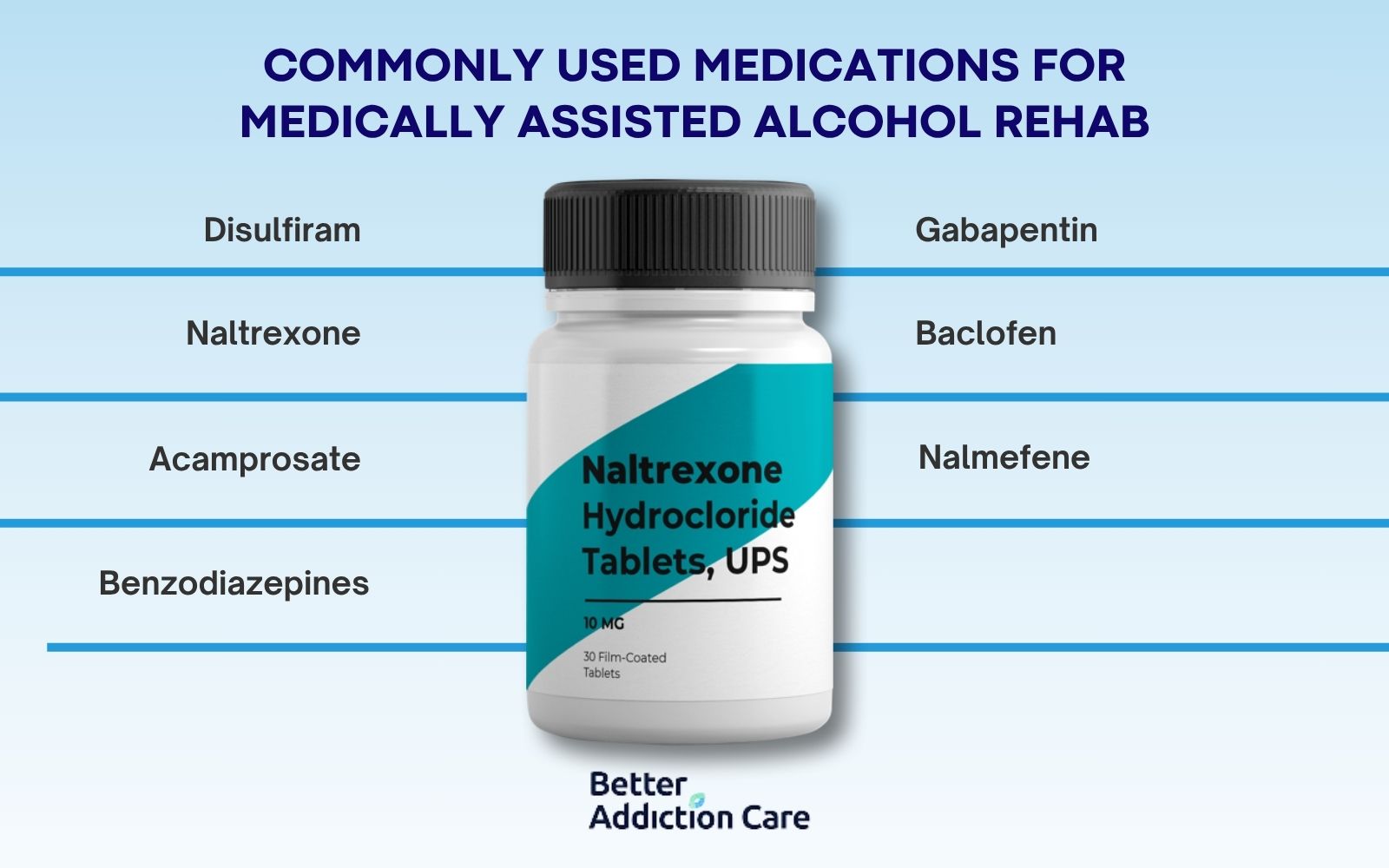
Commonly used medications for medically assisted alcohol rehab include FDA-approved medications like Disulfiram, Naltrexone, and Acamprosate, which each work differently to reduce cravings and support abstinence. During detox, Benzodiazepines help manage withdrawal symptoms, while other medications such as Gabapentin, Baclofen, and Nalmefene offer additional support for various aspects of recovery.
Common medications used for medically assisted alcohol rehab include:
Disulfiram (Antabuse®)
Disulfiram is a medication used after the initial detox period to help maintain abstinence from alcohol. It works by inhibiting the enzyme aldehyde dehydrogenase, which causes acetaldehyde to accumulate rapidly when alcohol is consumed. This accumulation produces unpleasant effects such as nausea, vomiting, headache, flushing, sweating, and chest pain shortly after drinking, creating a strong deterrent against relapse.
A 2014 study by Skinner, M. D. found that disulfiram had about 58% better outcomes for maintaining abstinence than control treatments, with even better results (70%) in open-label studies where patients were aware they were taking the medication, while blinded studies showed no significant differences.
Naltrexone (Revia®, Vivitrol®)
Naltrexone is an opioid antagonist that blocks the euphoric and relaxing effects of alcohol by binding to opioid receptors in the brain. This action reduces cravings and the motivation to drink, supporting relapse prevention and helping individuals stay committed to their treatment. Naltrexone is available in oral and extended-release injectable forms.
Acamprosate (Campral®)
Acamprosate helps restore the balance of neurotransmitters in the brain that are disrupted by chronic alcohol use. It is started around five days after detoxification and taken three times daily. By stabilizing neurochemical imbalances, acamprosate reduces alcohol cravings and supports sustained abstinence.
According to McPheeters, M.’s 2023 study, ‘Pharmacotherapy for Alcohol Use Disorder’, acamprosate shows effectiveness in treating alcohol use disorder with a 12% reduction in return to any drinking (RR, 0.88), while naltrexone at 50 mg/day demonstrated a 7% reduction in return to any drinking (RR, 0.93) and was associated with fewer drinking days over treatment periods (weighted mean difference, −4.99 days).
Benzodiazepines
Benzodiazepines such as chlordiazepoxide, diazepam, lorazepam, and oxazepam are used during acute alcohol withdrawal to prevent seizures and ease withdrawal symptoms. These drugs mimic alcohol’s effects on the brain, providing a smoother and safer detoxification process. Long-acting benzodiazepines are preferred for their steady effect.
Gabapentin
Gabapentin is an anticonvulsant that increases gamma-aminobutyric acid (GABA) concentrations by direct synthesis and by modulating voltage-gated calcium channels. It reduces alcohol withdrawal symptoms such as anxiety, insomnia, and cravings by counteracting reduced GABA activity and excessive glutamate release during withdrawal.
Baclofen
Baclofen is a muscle relaxant that acts as a GABA-B receptor agonist. It helps reduce alcohol cravings and withdrawal symptoms by modulating neurotransmission involved in alcohol dependence. Baclofen supports the reduction of alcohol intake and assists in maintaining abstinence, particularly in patients with liver impairment where other medications pose risks.
Nalmefene
Nalmefene is an opioid receptor modulator approved in Europe for reducing alcohol consumption in individuals with high-risk drinking patterns. It blocks opioid receptors involved in the rewarding effects of alcohol, thereby decreasing the desire to drink. According to van den Brink, W.’s 2013 study, ‘Efficacy of As-Needed Nalmefene in Alcohol-Dependent Patients with at Least a High Drinking Risk Level: Results from a Subgroup Analysis of Two Randomized Controlled 6-Month Studies’, As-needed nalmefene showed a statistically significant treatment effect over placebo in reducing both heavy drinking days (by 3.2 days per month) and total alcohol consumption (by 14.3 g/day) at Month 6 in alcohol-dependent patients with high drinking risk levels
What Happens During Medical Detox For Alcohol?
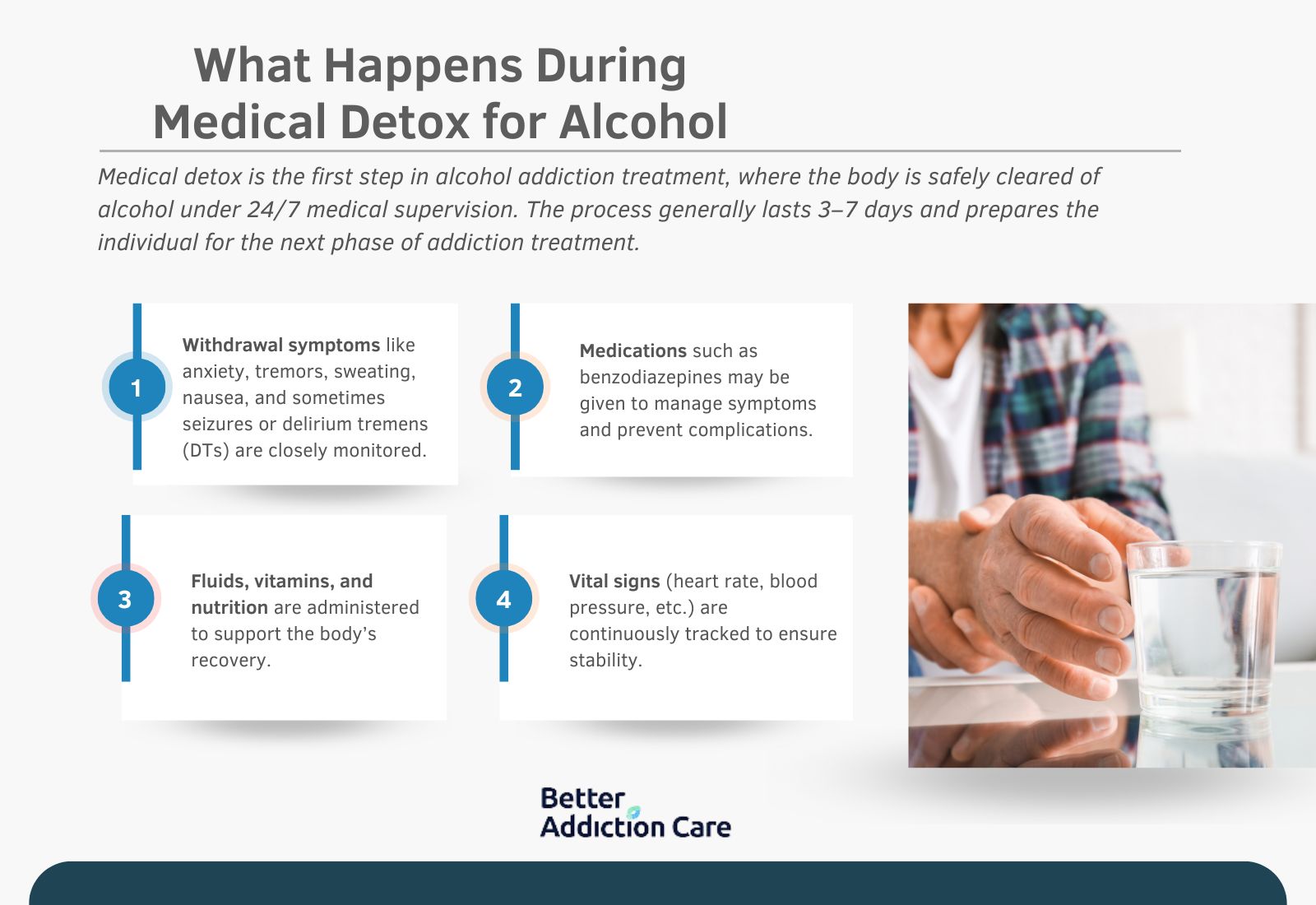
During medical detox for alcohol, the body clears itself of alcohol under supervised medical care to manage withdrawal symptoms and prevent complications. Medical staff monitor vital signs, administer medications such as benzodiazepines to reduce withdrawal severity, and provide fluids and nutrients to support physical stability. Patients experience symptoms like anxiety, tremors, sweating, nausea, and in severe cases, seizures or delirium tremens. The process typically lasts several days and serves as the first step in comprehensive alcohol addiction treatment.
How Long Does Alcohol Detox Take?
Alcohol detox takes between 3 and 10 days, depending on how much and how long you've been drinking, as well as your overall health. Withdrawal symptoms usually start within a few hours after your last drink, often peaking around day three. You might feel anxious, shaky, or nauseous at first, but many people notice relief by days four or five. While your liver clears alcohol at a steady rate—about one drink per hour—traces stay in your system for up to 24 hours. Detox is the first and most crucial step toward recovery, setting the foundation for long-term healing. Severe cases like delirium tremens require longer stabilization under medical supervision during alcohol detox. Detox is followed by ongoing treatment to address addiction comprehensively.
How To Safely Detox From Alcohol?
To safely detox from alcohol, seek medical supervision to manage withdrawal risks, especially if you've been drinking heavily, as stopping suddenly triggers severe symptoms like seizures or delirium tremens. Taper alcohol use under professional guidance, stay hydrated with electrolyte-rich fluids, and eat nutrient-dense foods to restore deficiencies. Track symptoms carefully, take prescribed medications like benzodiazepines and thiamine to reduce discomfort and avoid complications, and move into ongoing therapy or rehab after detox. Home detox suits only mild cases and still requires medical oversight for safety.
What Are The Common Alcohol Addiction Treatment Options?
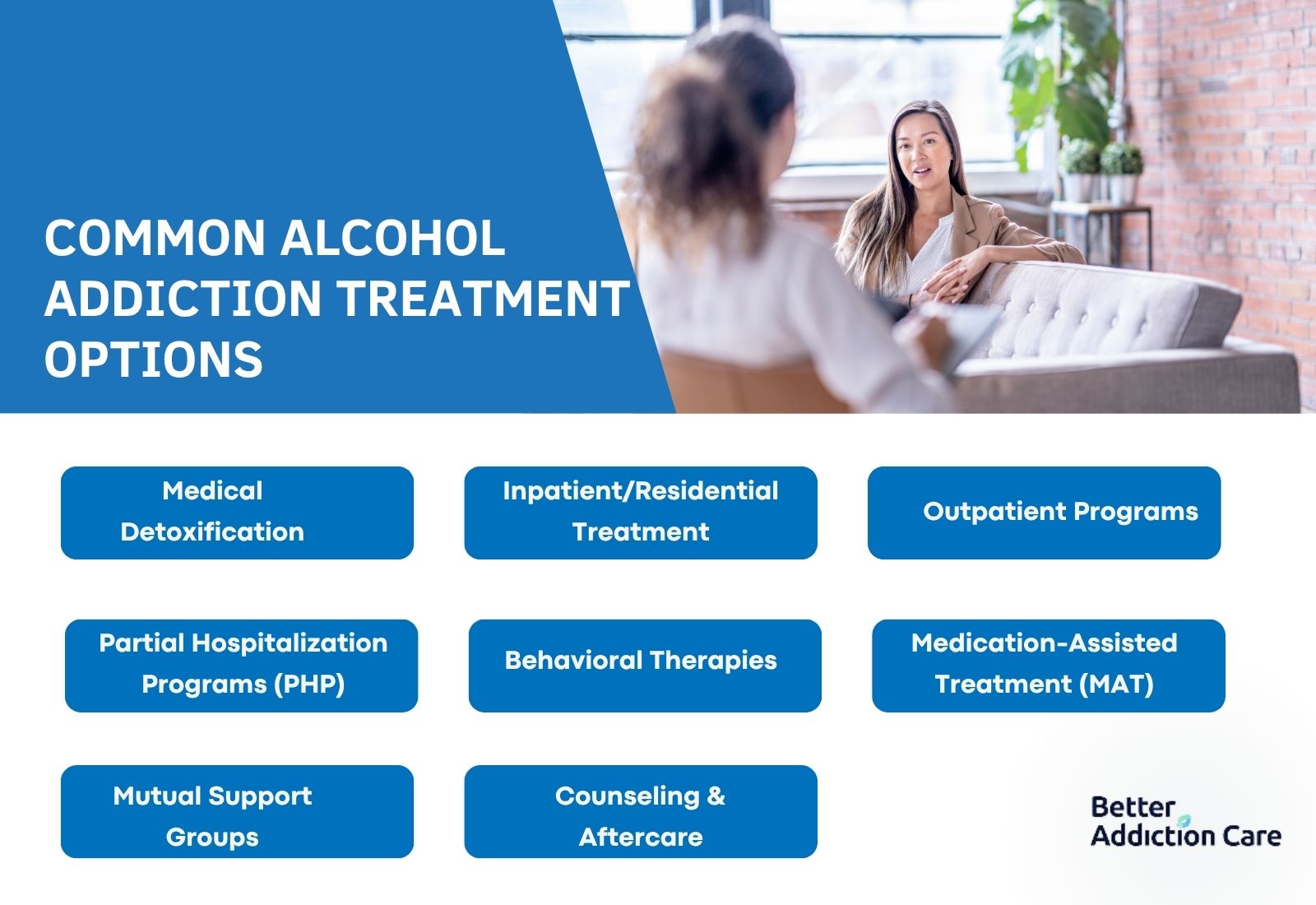
Common alcohol addiction treatment options include detoxification (medically supervised to manage withdrawal safely), residential/inpatient programs (24/7 care in a structured environment), outpatient programs (flexible therapy while maintaining daily routines), and behavioral therapies such as cognitive-behavioral therapy (CBT) or motivational interviewing. FDA-approved medications like naltrexone, acamprosate, or disulfiram are prescribed to reduce cravings or deter relapse. Mutual support groups (e.g., Alcoholics Anonymous) and counseling are also widely used to treat alcohol addiction. For severe cases, partial hospitalization programs offer intensive daytime treatment, while aftercare plans focus on long-term recovery post-treatment. Combinations of these approaches are recommended for effectiveness.
How To Find Medically Assisted Alcohol Rehab In Your Local Area?
To find medically assisted alcohol rehab in your local area, start with the SAMHSA treatment locator or contact your health insurance provider to verify coverage for medically assisted treatment (MAT) programs. Ask your primary care physician for referrals to qualified facilities offering medical detoxification. Local hospitals provide information about addiction treatment centers with medical supervision.
Our confidential helpline at (888) 766-0149 connects you directly with Better Addiction Care specialists who will guide you to appropriate facilities.
When you find alcohol rehab, select facilities offering "medically assisted treatment" or "MAT" programs. Choose between inpatient facilities with 24/7 supervision or outpatient programs based on your needs. Verify credentials through accreditations from CARF or the Joint Commission for quality assurance.
Does Insurance Cover Medically Assisted Alcohol Rehab?
Yes, insurance covers medically assisted alcohol rehab. The Affordable Care Act (ACA) classifies substance use disorder treatments, including medication-assisted treatment (MAT) for alcohol addiction, as essential health benefits. Private insurance plans, Medicaid, and Medicare include coverage for detoxification services, FDA-approved medications like naltrexone or acamprosate, and both inpatient and outpatient rehabilitation programs.
Coverage specifics differ between insurance providers and individual plans. Your policy includes requirements for pre-authorization, network restrictions, or limitations on treatment duration. Deductibles, copays, and coinsurance affect your out-of-pocket costs for medically assisted alcohol rehabilitation. To understand what your specific plan covers, verify insurance for a clear explanation of your benefits.
Related Articles
Treatment Centers in New Jersey





